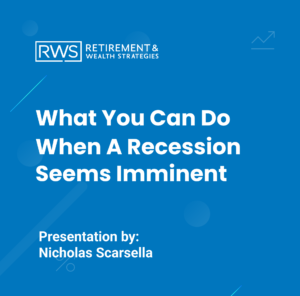Social Security – RWS Financial Wellness Series
/in Uncategorized /by rwsfinancialgroup
Subscribe to our YouTube channel: https://www.youtube.com/channel/UC852TbvU8yv2RlmtwNnVUaw
Simplifying Social Security
For many, the topic of social security can be viewed as very high level. But, to simplify it, there are certain requirements that need to be met before one is eligible to receive social security. You need 40 quarters worth of wages with the benefits then calculated off of the average of your 35 highest years of earning. In the last few years of your career, try to increase that income if possible because it will help increase social security benefits on the sustainability side.
In full disclosure, social security will likely change in the future in terms of how it operates so there are some slight things that the government can change to make sure that the social security income will continue to provide benefits to those in the U.S. It is widely speculated that changes will be coming down the pipeline including that the threshold for taxation on social security will likely increase and the age at which you can receive full benefits will continue to be pushed even higher. For example, the full retirement age for social security is currently 67 years old, a number that could possibly be changed to 70 in the future. Some of these slight changes can drastically improve the longevity of social security for Americans.
Understanding your eligibility
It’s important to grasp a basic understanding of social security including that ‘FRA’ stands for ‘full retirement age’. For example, if you were born in 1958, your full retirement age is 66 years old. It’s also crucial to know how much you’re going to be receiving which is called a ‘PIA’ or ‘primary insurance amount’. If you look at your social security statements, you’ll see your PIA on there. You are eligible to take social security prior to your full retirement age, i.e., if your full retirement age is 66 years old, you’ll receive 100 percent of your benefit at $2,000 a month. But that same individual could start taking social security as early as age 62 instead, thus receiving a lower benefit. You also have the ability to take your social security income later. So if you decide to defer social security, you can defer it all the way to age 70. You will receive 32 percent more in your monthly income by deferring it out. To recap, you can take your social security benefits before your full retirement age or after your full retirement age.
With that being said, there are some rules around making changes after you elect to take your social security income but once you do start, it’s generally what people will keep so they break even. For example, if you decide to take your income early at 62, your break-even point is 78 years old. If you take it at your full retirement, your break-even goes all the way out to 82 but at age 70, your break-even is 80. If you do start receiving money earlier, if you live a long life, you’re going to make less money. Therefore, it’s important to consider factors including:
• Your health
• Your family longevity
• Your family history
Should you wait or cash out early?
If your parents both live to be 100 while you and your siblings are all in great health as well, it’s advised to wait until age 70 to start collecting because you’re going to receive far more money in the long run. Back in 1960, the average life expectancy of a male was only 66 years old and for a female, that number was 73. But back then, you couldn’t collect social security income until you were 62 years old so people weren’t presumed to live to age 100. But fast forward to 2019, the life expectancy for a male is 84 years old and for a female, it’s 87. With people generally living much longer with a higher quality of life, some are going to end up being in retirement longer than their working years.
In 2019, 64 million retirees received social security benefits. That means almost half of those in the U.S. who collect social security have decided to collect it early. For those who do so and are still working, the government will withhold that social security income. But after you turn your full retirement age, you can collect social security and still can go to work and make as much money as desired. With that being said, if you are planning on retiring, choose your full retirement age as a good spot to start receiving social security income.
Could you be taxed? It’s tricky.
When it comes to taxes on social security income, it depends on an individual’s provisional income which is a combination of a modified adjusted gross income and half of the social security benefits being received. For instance, if you are married and your provisional income is between $32,000 and $44,000, half of your social security income can be taxable. But if your provisional income is more than $44,000, up to 85 percent of your social security income can be taxable. However, if tax rates do start to increase and you already have a pension or a large 401k or 403b and social security is also stacked on, the likelihood of you paying taxes on your social security income is fairly high.
Most people do not solely rely on social security income during retirement as it only makes up about a third of income, so many will turn to part-time or consulting work to still have money coming in. But as an investor and as a saver, it’s important to realize that living solely on social security income is not advised with the average payment being about $1,400 per month. To be proactive, it’s important to be open about your retirement budget and how much you want to spend in retirement. To do so, write it down to keep it top of mind where you can review it a few times a year. Also schedule regular check-ins with an advisor as things do change like moving, buying a new car, etc., so keep the plan up to date. Be sure to visit www.ssa.gov to create a username and password on the social security administration website to view your earnings along with your estimated social security income and your estimated social security disability. Remember that social security isn’t just about income, there are disability and benefits and other sectors.
Visit the RWS Group website at www.rwsgroup.org for more tips and resources.
Recommended Reading

Here to guide your next step.
Our advisors can get you closer to your dreams—showing you the right financial steps to take today and in the days to come.
Take the Next Step
Our advisors are here to give you more of the information you want, and the knowledge you never knew you needed.






